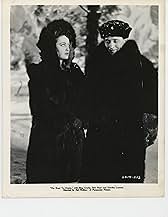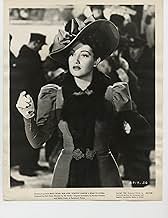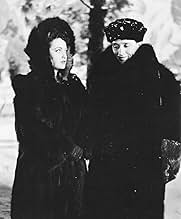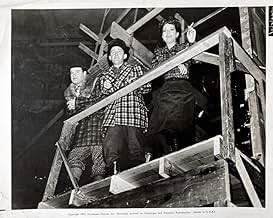IMDb-BEWERTUNG
7,1/10
3919
IHRE BEWERTUNG
Füge eine Handlung in deiner Sprache hinzuTwo vaudeville flops pose as bad guys and join the Klondike gold rush with a saloon singer.Two vaudeville flops pose as bad guys and join the Klondike gold rush with a saloon singer.Two vaudeville flops pose as bad guys and join the Klondike gold rush with a saloon singer.
- Für 1 Oscar nominiert
- 3 Gewinne & 1 Nominierung insgesamt
Jack La Rue
- LeBec
- (as Jack LaRue)
George Anderson
- Townsman
- (Nicht genannt)
Stanley Andrews
- Joe - Official at Ship
- (Nicht genannt)
Bobby Barber
- Bartender
- (Nicht genannt)
William 'Billy' Benedict
- Second Newsboy
- (Nicht genannt)
Carmella Bergstrom
- Woman
- (Nicht genannt)
Billy Bletcher
- Bear
- (Synchronisation)
- (Nicht genannt)
Phil Bloom
- Show Spectator
- (Nicht genannt)
Eddie Borden
- Man in Saloon
- (Nicht genannt)
Rudy Bowman
- Show Spectator
- (Nicht genannt)
Empfohlene Bewertungen
Crosby and Hope are at it again, this time searching for gold in Alaska. The great lines don't run as fast and furious here as they do in some of the other "Road" pictures, but there are still plenty of laughs to go around. The film loses some points in two areas: the unnecessary and unfunny commentary by Robert Benchley and the simple fact that the premise of the film is completely ridiculous. I still cannot figure out why Crosby and Hope would spend half the film pretending to be two men they know are wanted killers. Of course, thanks to movie magic, the local authorities seem to ignore this. However, these things don't detract much from this very funny film.
This is hardly an original insight, but anyone who dismisses Bob Hope as the tiresome, unfunny comic from those dreadful '60s 'comedies' he appeared in is missing out on a real national treasure - his films up to around 1952 are hysterically funny, and his ROAD entries with cohorts Crosby and Lamour are among the best of 'em. Hope, along with the brilliant Preston Sturges, had restored Paramount to the comedy throne they'd occupied in the early 30s; from the lavish budget and attention to period detail throughout UTOPIA, it's obvious that the studio was not ungrateful. For my money, ROAD TO UTOPIA is the funniest film he ever made (though there are half-a-dozen others close on its heels). As in all ROAD movies, the engine powering the vehicle was the lightning-quick banter between the two leads; Crosby smooth as snake-oil , Hope perpetually suspicious and cowardly. And with excellent reason, as no straight man ever victimized a foil the way Bing routinely does to Bob. ROAD movies always threaded their satires of B-movie plots (this one spoofing Robert W Service-style frozen-North melodrama) with plenty of topical humor, much of it capitalizing on the fans' awareness of the stars' personal foibles (Crosby's rivalry with Sinatra, his investments in thoroughbreds, Hope's disastrous box-office returns in LET'S FACE IT), and there's a goodly amount of what later generations referred to as 'breaking the fourth wall' ( they talk directly to the audience at varying points). What elevates UTOPIA over the others is the sky-high breezy confidence of everyone involved this go-around. The cast and crew, coming off ROAD TO MOROCCO, were on a roll and knew it and they ride that momentum for all it's worth, Hope's constant kibitzing particularly hilarious from start to finish. Der Bingle gets to groan a couple of subpar songs (as opposed to MOROCCO's highlights - 'Ho Hum' and 'Moonlight Becomes You' - this outing's 'It's Anybody's Spring' and 'Welcome To My Dream' are instantly forgettable) but the team's 'Put It There, Pal' is infectious fun and Miss Lamour's 'Personality' is sexy and sprightly. A further note on Lamour - she's luxuriously beautiful here, an ice-cream sundae with curves (why she's never ranked with the decade's top screen sirens is unfathomable: she's every bit the looker that Lake, Grable, Hayworth & Sheridan were, and a better singer besides). My apologies for not quoting any of the zingers from the script, but there are just too many of them to play favorites with. ROAD TO UTOPIA is well worth the effort it'll take you to track down; get cracking.
If you need some laughs, this is a movie for you. I think this is the fourth of the "Road" pictures that Hope and Crosby made together. "The Road to Rio" was good, too, but the ones that followed demonstrated a flagging of inspiration.
Here, they are the crew are at their best. The plot is screwball, as usual, and not worth spelling out. What counts are the songs, the gags, and the interplay between the three principals -- Hope, Crosby, and Dorothy Lamour.
Most of the Road pictures had one or two songs which wound up on the pop charts. They were usually kind of pretty and unpretentious, "easy listening", to coin a phrase. (Oh, bring it back, sob!) "Moonlight Becomes You," "Personality," "Welcome to My World." And Bing did most of the singing in his smooth baritone. Nothing more than proficient and pleasant to listen to, although he belonged to, I think, a peppy vocal trio in the early 1930s whose arrangements were kind of original.
The gags were usually amusing, sometimes laugh-out-loud funny. There was, inevitably the occasional clunker but everything was so good natured that they are easily forgiven. The script was by Panama and Frank, but many of the jokes were improvised on the set by the actors. Hope also brought in some gags from his platoon of writers (he was a famous radio comedian at the time), giving some of them to Crosby and Lamour as well. There was a good deal of playing with the fourth wall and a lot of in jokes too. Some of these may be lost on modern viewers. Eg., Hope is driving Crosby along on a dog sled, and he raises his arms and says, "Look Ma, no hands." "Look Ma, no teeth," remarks Crosby. "Please," says Hope, "my sponsor." His radio sponsor was Pepsodent Toothpaste.
The three principal actors play off each other well. Dorothy Lamour was an unpretentious actress of modest talents who never pretended to be anything else, although she provided a very nice frame to hang a sarong on. What I like most about the relationship between Hope and Crosby is the measured equality of their stupidity and greed. Hope wasn't really subordinate to Crosby. Everything Hope said and did was within the realm of human reality. He didn't have the flapping run or squeaky voice of Jerry Lewis. He didn't get slapped around like Lou Costello. He wasn't intellectually challenged. And Crosby was much more of a participant in the goings on than a straight man would be. He's hardly less gullible than Hope, and equally cowardly. When they're about to be boiled by cannibals or hanged by vigilantes, they trade wisecracks with one another. Crosby is the promoter and Hope is the stooge, but neither is superior to the others.
This really is a relaxing ride. I spent a summer doing a sociological study of Scagway. The set gives a surprisingly good suggestion of what it still looks like. It's a dramatic place overlooked by a proud glacier the color of blue glass. And the kind of Wild West atmosphere the movie evokes isn't entirely fictional. People had names like "Soapy Smith".
Here, they are the crew are at their best. The plot is screwball, as usual, and not worth spelling out. What counts are the songs, the gags, and the interplay between the three principals -- Hope, Crosby, and Dorothy Lamour.
Most of the Road pictures had one or two songs which wound up on the pop charts. They were usually kind of pretty and unpretentious, "easy listening", to coin a phrase. (Oh, bring it back, sob!) "Moonlight Becomes You," "Personality," "Welcome to My World." And Bing did most of the singing in his smooth baritone. Nothing more than proficient and pleasant to listen to, although he belonged to, I think, a peppy vocal trio in the early 1930s whose arrangements were kind of original.
The gags were usually amusing, sometimes laugh-out-loud funny. There was, inevitably the occasional clunker but everything was so good natured that they are easily forgiven. The script was by Panama and Frank, but many of the jokes were improvised on the set by the actors. Hope also brought in some gags from his platoon of writers (he was a famous radio comedian at the time), giving some of them to Crosby and Lamour as well. There was a good deal of playing with the fourth wall and a lot of in jokes too. Some of these may be lost on modern viewers. Eg., Hope is driving Crosby along on a dog sled, and he raises his arms and says, "Look Ma, no hands." "Look Ma, no teeth," remarks Crosby. "Please," says Hope, "my sponsor." His radio sponsor was Pepsodent Toothpaste.
The three principal actors play off each other well. Dorothy Lamour was an unpretentious actress of modest talents who never pretended to be anything else, although she provided a very nice frame to hang a sarong on. What I like most about the relationship between Hope and Crosby is the measured equality of their stupidity and greed. Hope wasn't really subordinate to Crosby. Everything Hope said and did was within the realm of human reality. He didn't have the flapping run or squeaky voice of Jerry Lewis. He didn't get slapped around like Lou Costello. He wasn't intellectually challenged. And Crosby was much more of a participant in the goings on than a straight man would be. He's hardly less gullible than Hope, and equally cowardly. When they're about to be boiled by cannibals or hanged by vigilantes, they trade wisecracks with one another. Crosby is the promoter and Hope is the stooge, but neither is superior to the others.
This really is a relaxing ride. I spent a summer doing a sociological study of Scagway. The set gives a surprisingly good suggestion of what it still looks like. It's a dramatic place overlooked by a proud glacier the color of blue glass. And the kind of Wild West atmosphere the movie evokes isn't entirely fictional. People had names like "Soapy Smith".
Bob and Bing pal through this in their breezy manner, ably assisted by Dottie Lamour and especially the dry witty commentary of humorist Robert Benchley. Students of film and lovers of movies will appreciate the quality of the production, and rejoice in the knowledge that not everything funny was created after 1990.
How does this zany mid-1940's comedy/musical rate in the year 2003? I'm going to venture a guess and suggest that it probably doesn't rate as high with viewers as it may have when it was originally released. Some of the gags and one-liners seem to be about pop-culture that is obscure in the new millenium. I had a strong sense that parts of the movie were originally funny but that the humor is lost on viewers who were not alive in the 1940's.
Notwithstanding, there are some very funny bits and one-liners in this film. Here and there throughout the film, the comedy clicked and I found myself laughing out loud. On the other hand, I have watched the film twice and both times that I watched it, I was growing tired of the endless one-liners to the point that they were becoming annoying. This film definitely seems to lose quite a bit of its comic sparkle by the end, and the ending is truly idiotic.
On the other hand, I did truly enjoy several of the songs in this movie. Two that stand out are Bing Crosby singing "Welcome to My Dream" and Dorothy Lamour singing "Personality". Unfortunately, some of the good songs, especially "Welcome To My Dream" seem a bit out of place in this zany movie!
Hillary Brooke, a fine 1940's actress who appeared in a couple of Sherlock Holmes movies is totally wasted in this comedy. She looks as though she is sleepwalking through her part. Her on-screen performance comes across as if she doesn't want to be participating in this move. She is far more competent as an actress than this movie would lead you to believe.
This movie is not for all tastes. Bob Hope and Bing Crosby fans may enjoy it, but time has not been kind to this movie. I give it a 7 out of 10 points.
Notwithstanding, there are some very funny bits and one-liners in this film. Here and there throughout the film, the comedy clicked and I found myself laughing out loud. On the other hand, I have watched the film twice and both times that I watched it, I was growing tired of the endless one-liners to the point that they were becoming annoying. This film definitely seems to lose quite a bit of its comic sparkle by the end, and the ending is truly idiotic.
On the other hand, I did truly enjoy several of the songs in this movie. Two that stand out are Bing Crosby singing "Welcome to My Dream" and Dorothy Lamour singing "Personality". Unfortunately, some of the good songs, especially "Welcome To My Dream" seem a bit out of place in this zany movie!
Hillary Brooke, a fine 1940's actress who appeared in a couple of Sherlock Holmes movies is totally wasted in this comedy. She looks as though she is sleepwalking through her part. Her on-screen performance comes across as if she doesn't want to be participating in this move. She is far more competent as an actress than this movie would lead you to believe.
This movie is not for all tastes. Bob Hope and Bing Crosby fans may enjoy it, but time has not been kind to this movie. I give it a 7 out of 10 points.
Wusstest du schon
- WissenswertesBob Hope recalled that during the scene where he and Bing Crosby were bedding down beside their cabin in the Klondike, they were to be joined by a bear. They were told that the bear was tame and its trainer would always be nearby. Against their better judgment they went along with it. However, when the cameras started filming, the bear ambled over to Hope and, instead of lying down next to him like it was supposed to, the animal sniffed him and started growling. Hope and Crosby immediately stopped the scene and refused to work with the bear any longer, despite the trainer's protestations that it was tame and harmless. The next day the bear attacked its trainer and tore his arm off.
- PatzerThe right arm of the person holding the talking fish is visible.
- Zitate
[Duke loses a talent show to a trained monkey]
Chester Hooton: [to Duke] Next time I bring Sinatra.
- Crazy CreditsNarrator Robert Benchley credits himself orally in a precredit sequence.
- VerbindungenFeatured in Paramount Presents (1974)
- SoundtracksPut It There, Pal
(1946)
Music by Jimmy Van Heusen
Lyrics by Johnny Burke
Played during the opening credits and also as background music
Performed later by Bing Crosby and Bob Hope
Top-Auswahl
Melde dich zum Bewerten an und greife auf die Watchlist für personalisierte Empfehlungen zu.
- How long is Road to Utopia?Powered by Alexa
Details
- Laufzeit
- 1 Std. 30 Min.(90 min)
- Farbe
- Seitenverhältnis
- 1.37 : 1
Zu dieser Seite beitragen
Bearbeitung vorschlagen oder fehlenden Inhalt hinzufügen

![Trailer [EN] ansehen](https://m.media-amazon.com/images/M/MV5BNWRiMzM4OTktNDlkMS00YWJiLWEwNDMtZTY0ZjAwMzY3YjM2XkEyXkFqcGdeQXRyYW5zY29kZS13b3JrZmxvdw@@._V1_QL75_UX500_CR0)






















